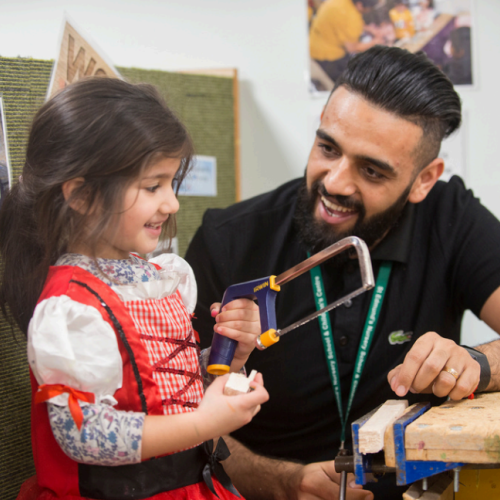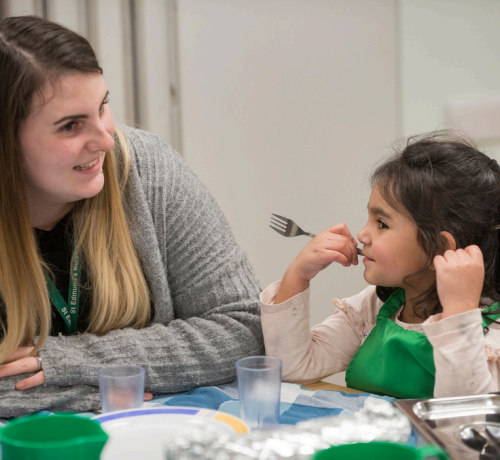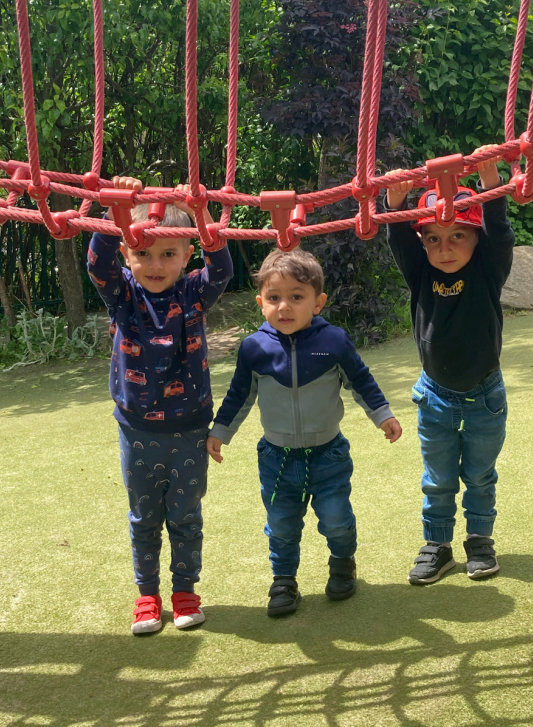Blog
Nurturing Excellence in the Early Years: The Value of Apprenticeship Training Rooted in Evidence Informed Practice
A Growing Team and Growing Expertise
As the Executive Headteacher of two outstanding nursery schools, who have employed apprentices for many years, I know first-hand the immense value that they bring. Apprenticeships are an ideal way to develop the next generation of skilled early years educators. Apprentices quickly become valuable members of the team and with support and guidance can begin embedding the very best in evidence-informed practice, right from the start. In this blog, I want to share why employing apprentices is such a valuable choice for early years settings, and how grounding their learning in research-based approaches benefits children, apprentices, and settings alike.
Why Employ Apprentices?
A Fresh Perspective and Passion Apprentices bring enthusiasm, energy, curiosity, and creativity to our setting. They are eager to learn and thrive by working alongside experienced practitioners, gaining not just theoretical knowledge but also the skills to apply that theory in daily practice. At the same time, experienced staff benefit by revisiting and sharing the reasons behind our approaches, reinforcing the evidence base that underpins what we do and why we do it.
Meeting Workforce Needs
Apprenticeships also play a vital role in addressing the current shortage of skilled early years practitioners. As noted by the Early Intervention Foundation (EIF), "highquality early years education depends on the skills, knowledge, and ongoing training of its workforce". By investing in apprentices, we are helping build a sustainable and well-trained workforce that can meet the needs of our youngest learners into the future.


Evidence-Informed Practice: The Gold Standard
At our nursery schools, we want every practitioner— whether experienced or new to the profession—to make decisions based on what works. Evidence informed practice ensures that the strategies and interventions we use are proven to positively impact children’s development and learning. During a recent Ofsted inspection at one of my schools, the inspector observed that “every single interaction was of very high quality and supported the developing communication and language skills of ALL children.” Impressively, our apprentices - some of whom had joined us only a month earlier - were already applying evidence-based learning in their practice and having a real, positive impact on the children.
Using Trusted Research Sources
Two key resources I always recommend to apprentices are: The Education Endowment Foundation (EEF)* Their Early Years Toolkit is an invaluable resource for practitioners at all levels. It summarises evidence on approaches such as developing communication and language, self-regulation strategies, and play-based learning. For example, EEF research shows that "Communication and Language approaches typically have a very high impact and increase young children’s learning by seven months” By accessing the EEF Evidence Store, apprentices can see video examples of how these approaches work in practice, with tools to support their implementation. The Early Intervention Foundation (EIF)* Their Early Years Library is a practical evidence informed resource for early years educators. As an example, practitioners can use the Regulating emotions booklet (within the series on Social and Emotional Skills) to help children monitor and manage their emotions and related behaviour.
Bringing Evidence to Life in Training
When training apprentices to support children’s language development, we use evidence-based resources for support such as: A Guide to Serve and Return: How Your Interaction with children can build brains (Center on the Developing Child Harvard University) which talks about the “responsive interactions between children and the people who care for them, and how those interactions help children grow and reach their full potential”.

The Importance of Reflection in Apprentice Training
Alongside learning about evidence-informed strategies, reflection is a crucial part of an apprentice’s growth. Reflection enables them to evaluate their practice, celebrate successes, and identify areas for improvement. In our nursery schools we use video as an invaluable tool for amongst many things, self-reflection. Right from the start, Apprentices are encouraged to video more experienced practitioners - to observe, learn, evaluate practice and note children’s developing skills and progress. We also encourage our Apprentices to video themselves and each other. Through watching these videos back with a supportive colleague Apprentices are supported to reflect on their own practice and learning.
The focus is first and foremost on ‘what went well’, with praise and encouragement being a vital part of the process. We note the pedagogical strategies that were used to effectively support the child i.e. ‘Adult uses interactions that extend language, communication and vocabulary effectively’ and Apprentices are encouraged to consider the positive impact their actions had on a child’s development and learning. When appropriate, we may include the question, “What could be done differently next time?” during reflection conversations, helping to reframe any negativity an apprentice may feel about their practice into an opportunity for learning and growth.
As highlighted in the EEF Guide to Effective Early Years Development, "effective professional development includes opportunities to learn, practice, and reflect." Providing these opportunities for our apprentices (and all early years educators) is essential, as it encourages them to become more intentional and purposeful in their practice.
Investing in the Future
By employing Apprentices and embedding evidence informed practice into their training, we are investing not only in individuals but in the future of early years education. As we all know and extensive research tells us, the early years are a critical time for development and learning. and having the right people, trained in the right way, to support children during these important years is crucial. As early years educators and leaders, let’s commit to giving apprentices the tools, skills, and support they need to thrive. By drawing on the resources available to us, like the EEF Early Years Toolkit and Evidence Store, the EIF Early Years Library, and fostering a culture of reflection, we can ensure every Apprentice gets the best start to their career.
Let’s nurture not just our children, but also the early years educators of tomorrow.
Early Years Resources:
Early Years Evidence Store (EEF)
Guide to Effective Early Years Development (EEF)
A Guide to Serve and Return: Center on the Developing Child Harvard University
 |
Sian Hudson Executive Headteacher, St Edmund's Nursery School and Lilycroft Nursery School.
|
